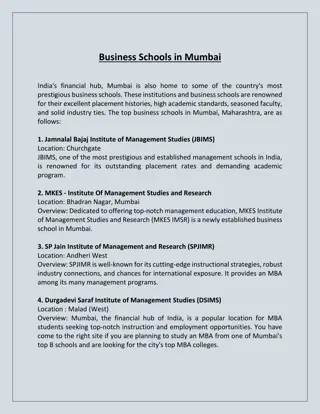Principles of Management and Dabbawalas in Mumbai
In this content, explore the principles of management exemplified by the Mumbai Dabbawalas, showcasing values of responsibility and humanity in their efficient service.
Download Presentation

Please find below an Image/Link to download the presentation.
The content on the website is provided AS IS for your information and personal use only. It may not be sold, licensed, or shared on other websites without obtaining consent from the author.If you encounter any issues during the download, it is possible that the publisher has removed the file from their server.
You are allowed to download the files provided on this website for personal or commercial use, subject to the condition that they are used lawfully. All files are the property of their respective owners.
The content on the website is provided AS IS for your information and personal use only. It may not be sold, licensed, or shared on other websites without obtaining consent from the author.
E N D
Presentation Transcript
Principles of Management 1. Toyota-language-spirit of law of every nation- culture-clean and safe products-advanced technologies-individual creativity- teamwork- research and creativity 2. Fredrick Winslow Taylor and Henri Fayol Taylor-American mining engineer-scientific principles Fayol-French mining engineer-administrative principles
Principles of Management 1. Meaning: Mngt principles are broad and general guidelines for decision making and behaviour of managers. 2. Nature of Management Principles Universal application: applied to all types of org- biz and non biz-public & private sector. Eg. Principle of division of work General guidelines: cannot be used as readymade solution for any problem. Eg-principle of stability of tenure
Principles of Management Formed by practice and experiments: Developed after years of observation and experiments on humans. Hence evolutionary in nature. Eg. Principle of division Flexibility: can be modified by managers. Not rigid. Eg. Principle of division Behavioural in nature: based on behaviours of employees. Made to improve relationships between workers. For eg-principle of discipline
Principles of Management Nutan Tiffin Box service was started in Mumbai by the Mumbai Dabbawalas. The Dabbawalas who are the soul of entire Mumbai aim to provide prompt and efficient services by providing tasty homemade tiffin to all office goers at the right time and place. The service is uninterrupted even on the days of bad weather, political unrest and social disturbances. Recently, they have started online booking system through their website mydabbawala.com . Owing to their tremendous popularity amongst the happy and satisfied customers and members, the Dabbawalas were invited as guest lecturer by top business schools. The Dabbawalas operate in a group of 25-30 people alongwith a group leader. Each group teams up with other groups in order to deliver the tiffins on time. They are not transferred on frequent basis as they have to remember the addresses of their customers. They follow certain rules while doing trade no alcohol during working hours; no leaves without permission; wearing white caps and carrying ID cards during business hours. Recently, on the suggestion of a few self-motivated fellow men, the dabbawalas thought out and executed a plan of providing food left in tiffins by customers to slum children. They have instructed their customers to place red sticker if food is left in the tiffin, to be fed to poor children later. State any one characteristic of management mentioned in the above case. Give any two values which the Dabbawalas want to communicated to society. Management is goal oriented as it seeks to integrate the efforts of different individuals towards the accomplishment of both organizational and individual goals. (The other correct answers are management is intangible/ group activity/dynamic) The two values that Dabbawalas want to communicate to society are: Concern for poor/ Humanity Responsibility
Significance of Principles of Management Providing managers with useful insights into reality: Real works situations Enhances the knowledge and understanding of diff types of managerial situations. Solves recurring issues effectively with previous experience Promotes managerial efficiency Eg. Stability of tenure (changing employees job)
Significance of Principles of Management Optimum utilisation of resources and effective administration: Understand cause and effect relationship. Hence decisions and actions are cost effective Promotes personal & professional growth of managers enabling them to such decision that facilitate optimum utilisation of resources For eg: knowledge about principle of division of work helps manager to assign duties
Significance of Principles of Management Scientific decisions: Managers ability to take timely, realistic and effective decisions Helps managers to assess problems and take scientific decisions based on logic rather than guess work For eg: knowledge about principle of subordination of individual interest to general interest helps managers to take rational decisions
Significance of Principles of Management Meeting changing environment requirements: Business environment is dynamic in nature Principles can be flexible,hence can be modified For eg: Principle of division of work is helping for outsourcing the biz. activities
Significance of Principles of Management Fulfilling social responsibility: Growing realisation of social responsibility in business Principles helps to develop the sense of realisation towards social responsibilities among diff groups For eg: Principle of equity removes prejudices and fulfills social responsibility
Significance of Principles of Management Management training, education & research: Learners are provided in-depth understanding about principles of management to develop knowledge and skills Various research initiatives undertaken in the field of management are based on principles Modern management is regarded as separate discipline worldwide because of principles
Significance of Principles of Management Aapka Vidyalaya believes in the holistic development of students and encourages team building through a mix of curricular, co-curricular and sports activities. On its Founder s Day, a stage performance had to be put up. A committee of ten prefects was constituted to plan different aspects of the function. They all decided to use recycled paper for decoration. There was a spirit of unity and harmony and all the members supported each other. With mutual trust and a sense of belonging, the programme was systematically planned and executed. Kartik, one of the prefects, realised that the group had unknowingly applied one of the principles of management while planning and executing the programme. He was so inspired by the success of this function that he asked his father to apply the same principle in his business. His father replied that he was already using this principle. State any two features of management highlighted in the above paragraph. Identify any two values which Aapka Vidyalaya communicated to society. The two features of management mentioned in the above paragraph are as follows: Management is goal oriented as it seeks to integrate the efforts of different individuals towards the accomplishment of both organizational and individual goals. Management is pervasive as it is applicable to all types of organizations, (economic, social, political) all sizes of organizations (small, medium, large) and at all levels of management (top, middle and lower). The two values that Aapka Vidyalaya communicated to society are: Responsibility Sustainable development.
Fayols Principles of Management Background & History: Henri Fayol was a French management theorist who made scientific org. of labour His life span ranged from the year 1841-1925 He was an engineering graduate from the mining academy of St.Etienne in 1860 in mining engineering At the age of 19, he worked in a mining co. and served as MD from the year 1888 to 1918.
Fayols Principles of Management Major Contribution of Fayol: He s known as Father of General Management Fayol s administrative theory focuses on managerial efficiency by controlling the prodn costs He was the first person to identify four functions of mngt-planning, organising, directing and controlling The 14 principles of mngt. Is detailed in his book General & Industial Mngt in 1949.
Fayols 14 Principles of Management 1.Division of Work: According to Fayol, The intent of division of work is to produce more and better work for the same effort . He suggests that the whole org. work both managerial and technical should be divided into specialised jobs. Specialisation promoted speed, efficiency and accuracy in work and facilitates growth of org.
Fayols 14 Principles of Management Division of Work: -Positive effects Specialisation: if work is divided according to qualification-leads to specialisation Improves efficiency-employee performing one part of job leads to efficiency Division of Work: -Negative effects on violation Lack of efficiency No specialisation and duplication of work
Fayols 14 Principles of Management Division of Work: Zeal Ltd. Is a consumer goods company who has divided work into separate dept. like prodn, finance, mktg, HR etc. Work is assigned in accordance with their potential which leads to efficiency and specialisation
Fayols 14 Principles of Management 2. Discipline: Discipline means obedience to the rules and regulations of org. According to Fayol, It requires good superiors at all levels, clear and fair agreements and judicious application of penalties For eg. The employees of McDonalds are required to sanitize their hands every 30 minutes
Fayols 14 Principles of Management Discipline: Positive Effects of application Negative Effects of violation Systematic working of org Lead to chaos and confusion Effective realisation of goals Non-achievement of goals Promotes well defined commn Non-healthy work environment Develops sense of commitment Leads to wastage of resources
Fayols 14 Principles of Management 3. Authority and Responsibility: Authority refers to right of a person to give orders and extract obedience from subordinates. Responsibility refers to obligation of a subordinate to perform the assigned task to the best of his ability and skill. According to Fayol, Authority is the right to give orders and obtain obedience and responsibility is the corollary of authority For eg. Mehul a prodn mngr was given the responsibility to increase the prodn unit in his org, but the authority to purchase the raw material was not given. Hence he couldn t achieve the target.
Fayols 14 Principles of Management Authority and Responsibility: Positive Effects of application Negative Effects of violation Minimises misuse of authority Excess of authority is likely to be misused Effective realisation of goals Non-achievement of goals Easy to impose accountability Difficult to create accountability Ensure smooth working of org Insufficient authority may lead to disruption of work
Fayols 14 Principles of Management 4. Unity of Command: It suggests that for each member in a formal org. there should be one and only one from whom he should receive orders and be responsible to. According to Fayol, There should be only one boss for every individual employee For eg. Prakash, a sales exec was authorised to give 15% discount to customers by Mktg Mngr but finance mngr insisted only 10% discount. This lowered the productivity of Prakash.
Fayols 14 Principles of Management Unity of Command: Positive Effects of application Negative Effects of violation Systematic working of org. May confuse the subordinates Effective working of superiors and subordinates Leads to ego clashes among superiors Facilitates coordination and communication Difficult healthy environment Easy to fix responsibility for mistakes Leads to wastage of resources
Fayols 14 Principles of Management 5. Unity of Direction: It suggests that each group of activities having the same objective must have one head and one plan. According to Fayol, In order to achieve goals of the org. all the units of an org. should be moving towards the same objectives through coordinated and focused efforts For eg. Holistics Living Ltd. Has two mfg units-organic food products and eco-friendly handicrafts. They have two division, separate resources and has separate divisional head. This leads to unity of direction.
Fayols 14 Principles of Management Unity of Direction: Positive Effects of application Negative Effects of violation Systematic working of org. May have adverse effect on work efficiency Effective working of superiors and subordinates Non-achievement of goals Facilitates coordination and communication Difficult to create coordination Easy to fix responsibility for mistakes Leads to wastage of resources
Fayols 14 Principles of Management 6. Subordination of Individual Interest to General Interest: Every org. is set up to achieve certain objectives. At the same time, every employee has some individual interest for working in a org. Mngr should ensure the org. objectives supersedes individual interest. According to Fayol, For all times the interests of an org should take priority over the interests of any one individual employee For eg. The employees of Tantaloons Ltd an export house, willingly agree to overtime as and when required in the organisation so that the deadlines can be met on time.
Fayols 14 Principles of Management Subordination of Individual Interest to General Interest : Positive Effects of application Negative Effects of violation Curb undesirable behavior of employees. Difficult healthy work environment Ensures realisation of goals Non-achievement of goals Promotes unity of action Difficult to create coordination Develops sense of commitment Leads to wastage of resources
Fayols 14 Principles of Management 7. Remuneration of Employees: The wages paid to the employees should be fair so that they are able to sustain a reasonable standard of living. According to Fayol, the overall pay and compensation should be fair to both employees and the org. For eg. If in a particular year the org. has earned more profits, then some part of profit can be given to employees in the form of bonus.
Fayols 14 Principles of Management Remuneration of Employees : Positive Effects of application Negative Effects of violation Helps to create a healthy work environment. Dissatisfaction among employees Ensures smooth running of org. High labour turnover Achievement of desired goals Poor work performance of employees Reduce labour turnover Conflicts bet workers and mngt























